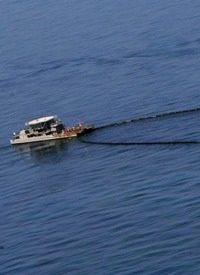
Industry and government officials continue their desperate efforts to contain an oil leak in the Gulf of Mexico that began on April 20 with an explosion on the Deepwater Horizon oil rig, claiming 11 lives. Representatives from the three major companies involved in the accident — Transocean Ltd., BP America, and Global Business Lines — testified earlier this week before the U.S. Senate Committee on Energy and Natural Resources. Transocean built the rig, BP was its leaseholder and operator, and Global Business Lines supplied the cement used to encase and seal the oil well. Each company blamed the others for failure to follow appropriate procedures and safety precautions.
Meanwhile, media reports of catastrophic environmental damage are spurring extreme measures on Capitol Hill to significantly increase federal regulatory power.
As federal recovery efforts escalate, scientists poised to help are frustrated at the lack of real-time data the Deepwater Horizon Response team is making available, says Dr. James J. O’Brien, professor emeritus of Meteorology and Oceanography at Florida State University. Though he understands why federal agencies like NOAA would “play it safe” with the general public, he argues scientists who specialize in pertinent areas should be more involved.
Adding to the problem, says O’Brien, is erroneous information, such as reports the leaked oil could move toward the loop current around Florida and reach North Carolina. “There is essentially zero chance of that,” he said, explaining currents are pushing the spill in the opposite direction toward Louisiana and Texas. Inaccurate reports are inflicting economic harm to the area as well, he noted, citing a recent alert about Destin beaches later proven false, but not before tourists began canceling travel plans in droves. “It’s a serious problem,” O’Brien warned. Yet he said Floridians have a sense of humor about it. “I saw a Tallahassee restaurant sign yesterday that said ‘Oil-free Grouper for Dinner.'”
He is equally critical of current response efforts. “The absorbent booms they’re using are not effective with winds that cause 3- to 5-foot waves.” He also said they are not “burning enough to make a dent.” But he admits the leak poses a significant challenge in 5,000 feet of water. “It’s like trying to unclog a toilet while you’re standing on a ten-foot ladder with a long stick attached to the plunger.”
He accuses the three companies involved of not being forthright about “hundreds of violations” that led to this accident. O’Brien ultimately blames the Bush administration for reducing regulations, allowing companies to relax safety standards. “Remember the mining disaster in West Virginia? Inspectors had identified many things that were wrong. But companies find loopholes,” O’Brien charged.
Until the leaks are contained, he believes it is impossible to determine what the environmental or economic impact will be. “When the media talks about a lot of dead fish, you have to ask what size fish. Little fish the size of your finger don’t have the mobility, and they’ll die. Bigger fish will recognize the problem and get out of there.” He said there will be much bigger problems if oil reaches the wetlands. “A lot of animals and birds will die, and sediments will last a long time.”
Dr. Walter Starck, of Townsville, Australia, paints a different picture. Starck holds a Ph.D. in biological oceanography and is a marine biologist who specializes in coral reefs and fisheries. He maintains that the media overplays oil spills’ effect on wildlife. “The popular image of dead and dying birds and mammals covered in sticky oil is a relatively brief event, and as sad as it may be at the time, their populations soon recover.”
He points out crude oil is an organic substance, and natural leaks are normal. Though spills caused by humans are much more concentrated and cause a temporary mess, they are also more short-lived and do not wreak the amount of environmental damage mainstream media reports claim. “The volatile components largely evaporate within a few days, and much of the heavier residue is broken down by microbial action over a few months. The heaviest residue accumulates sediment particles and sinks to the bottom where it mixes with further sediment and ends up no more harmful than pieces of the bitumen used for roads.”
Starck contends that clean-up efforts from past oil spills have “only increased environmental damage and delayed natural recovery.” The dispersants injected into leaking oil to prevent it from surfacing are “far more damaging to marine life” than crude alone, mixing with it to form a toxic sludge. “Their only real purpose is cosmetic and PR at the expense of the environment.”
While O’Brien calls this a “singular” and “catastrophic” event, Starck remains reserved. “Right now it’s a big thing. In a year or two it will become a past irritant no longer of concern.” He uses a vivid analogy to support this claim, describing the largest oil spill in history during the first Persian Gulf War. In 1991, between 6 and 8 million tons of oil spilled into a shallow reef area, but nothing was done about it since workers had to deal with area oil well fires. “Follow-up studies found that within 4 months, most of the oil had been degraded naturally, and within 4 years even the most heavily affected areas had largely or completely recovered.” He predicts a 95 percent recovery for the Gulf states within about four years.
Starck is also less critical of the three companies involved, calling it a major loss for them. “You can be sure they are doing everything possible, and no one else in the world is better equipped and qualified to do this job. Criticizing them is beyond moronic.” He says it is “beyond stupid” to impose fines and increase liability “for a useless cleanup charade,” fines which only serve to punish the end consumer who ultimately has to pay for increased production costs.
Instead, his criticism is directed at federal involvement. “The best thing the government can do is to stay out of the way, let the companies take the lead and render assistance if requested. Having a bunch of bureaucrats meddling in this is a recipe for another Katrina.”
Both Starck and O’Brien agree, however, rumors that sabotage caused the explosion are unfounded.
Photo: AP Images




